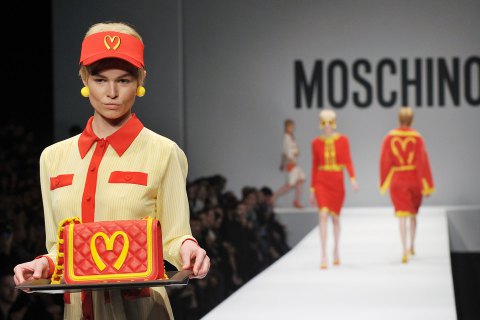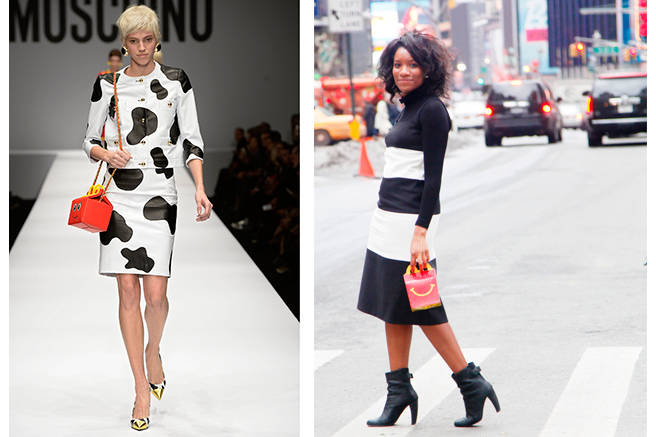HARRIET HALL discusses the immense Macdonald’s empire, and its influence within fashion, education, religion, and world peace.
The McDonald’s catchphrase, ‘I’m lovin’ it’, popularised through the dulcet tones of JT, is certainly apt, as McDonald’s remains the most popular fast-food chain in the world. McDonald’s appeals to many, from children begging their parents for happy meals, to adults working and commuting late and of course, the drunken students. I myself consider McDonald’s my post night out Mecca, where all I have to do is flash my student card to get a free cheeseburger. However, although in my fairly inebriated state I feel that McDonald’s is on par with a Byron burger, in the cold sober light of day, the food is less appealing. ‘Cheese’ Burger is open to interpretation. I don’t know what it is and I don’t really want to know, but is it really cheese? I doubt it will be gracing the cheese boards of middle class dinner parties anytime soon. Additionally, one hopes that the meat in the burger actually used to moo.
McDonald’s food is immortal, taking abnormal amounts of time to decay; if a burger is exposed to air for more than two hours the bread bun takes on the consistency of concrete. Additionally, it has become emblematic of the obesity epidemic of the Western World. Despite this, McDonald’s is one of the most powerful brands of our society and we are definitely still ‘lovin’ it’. It is an force that is here, not just to stay, but to increase.
The McDonald’s empire stretches over 119 countries. And for those few remaining that are still yet to be colonised by the imperial domination of its golden arches, fear not, McDonald’s is still expanding. The king of the fast food industry sells more than 75 hamburgers per second, employs more than 1.8 million people worldwide and has a daily customer traffic of around 68 million. A formidable economic force, MacDonald’s is the largest private sector employer in Britain and is listed as number six on Forbes’ World’s most valuable brands list. Perhaps more worryingly, the golden arches of McDonald’s are recognised by more people than Jesus’ cross. Christianity appears to have competition from the worship of Ronald McDonald and his high salt, high fat produce. This is one example of how the Ronald McDonald infiltration is not strictly confined to the realms of the restaurant sector; comparable to a chicken nugget plague, McDonald’s is spreading fast into other aspects of today’s society, taking no prisoners.
McDonald’s epitomises globalisation, synonymously referred to as McDonaldisation. The brand has had a significant impact on the global economy, with The Economist even establishing the ‘Big Mac Index’, which compares the cost of a Big Mac in various world currencies as an informal judge of theses currencies’ purchasing power parity. Some have even claimed that McDonald’s has such global significance, that its presence signifies global peace. Thomas Friedman established the “Golden Arches Theory of Conflict Prevention”, which suggests that no country with a McDonald’s has ever gone to war with one another, as being a ‘McDonald’s country’ would suggest you are economically developed and thus do not require war. Apparently McDonald’s has the power to solve world conflict as well as hangovers. Perhaps we should offer Putin and the interim Ukrainian government the 20 chicken McNugget shareBox?
It appears that the influence of the McDonald’s brand is so strong that it not only influences global relations, but we’re even now expected to wear it. During the recent Milan Fashion week, we saw Jeremy Scott’s debut collection for Moschino, inspired by, of course, McDonald’s. With the red and yellow colour scheme and the bold golden arches, this new line is an over the top, glamorised ver-sion of the McDonald’s workers’ uniform. One of the accessories is actually a ‘Happy Meal’ in-spired purse (available in August for those of you who feel they need this in their life) at around the £400 mark. However, if you can’t wait till then and don’t want to blow your student loan on this ‘must have’ item, the real Happy Meal is available now at your local McDonald’s for the cheap, cheap price of £2-£3. This price also includes the actual food. Bargain. However, this trend has caused offence with many McDonald’s staff, who survive on minimum wage whilst this Moschino merchandise is selling for hundred of pounds. A hideous fashion statement, reflecting a more hide-ous reality; McDonald’s has conquered even more of the Western commercial culture.
Furthermore, McDonald’s has managed to penetrate Britain’s education system. McDonald’s now has significant influence in the education of the minds of the future. In March 2010, it was an-nounced that GCSE students would be eligible to gain the equivalent of a B grade GCSE for two weeks work experience at McDonald’s, involving preparing and serving the food. It appears that in Britain, McDonald’s is powerful and influential enough to be considered a valid GCSE equivalent. Who needs to slog over grammar or mathematic equations when you can get similar qualifications through McDonalds? Britain, by succumbing to the overwhelming influence of the McDonald’s brand, has successfully devalued the quality of all our GCSE grades. Would you like fries with that?
Ultimately, the McDonald’s brand has managed to infiltrate multiple aspects of many societies. It clearly plays a huge role in the global economy, culture and now even the education of our young Britons. Its influence is inescapable, unless of course I want to emigrate to North Korea or Kazakhstan. However, who knows how far McDonald’s imperial expansion will take it in the future. The question now is, where will it stop?







